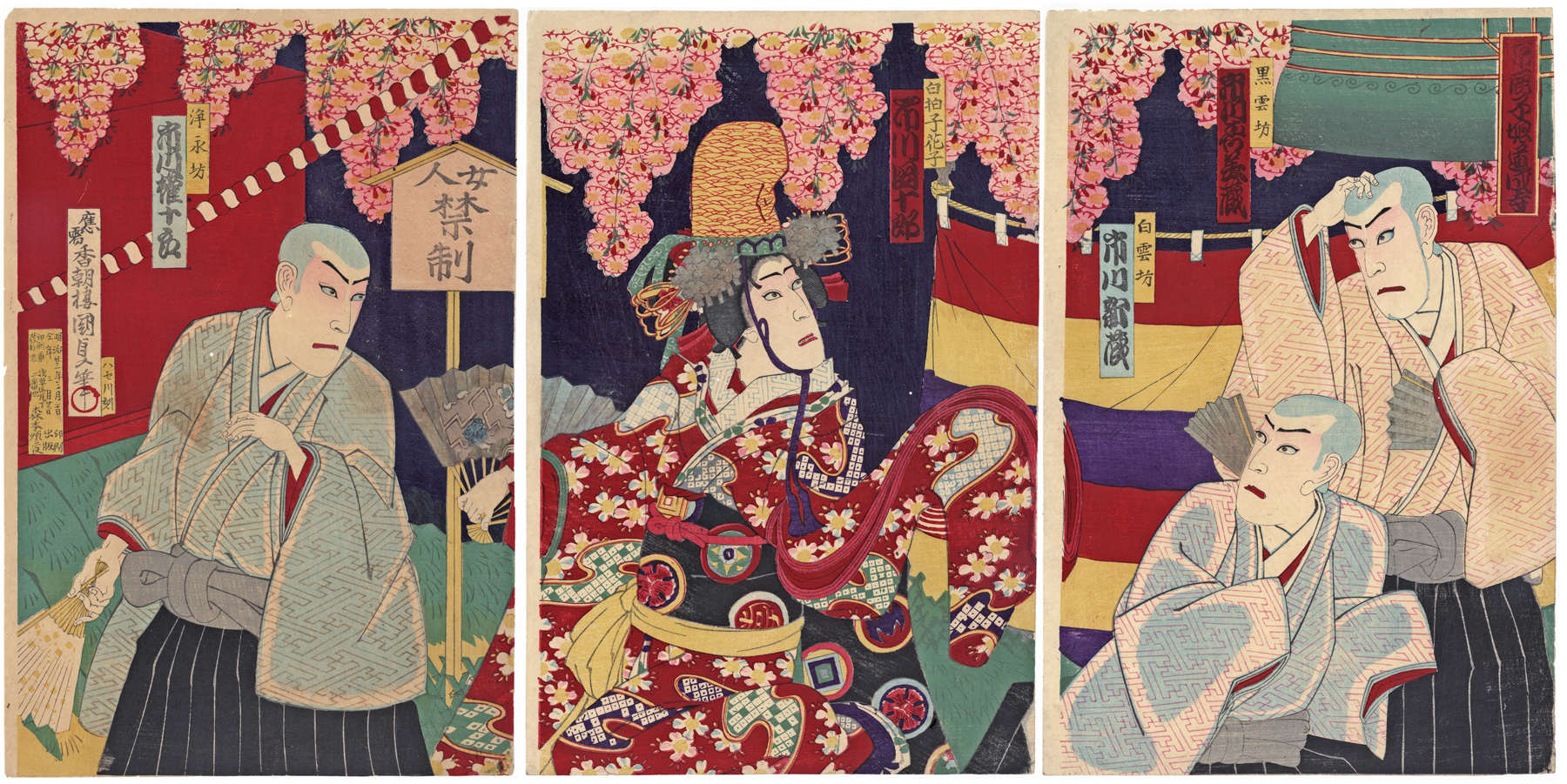This print advertises the March 1890 performance at the Kabuki-za of one of the greatest works of dance in Kabuki, Kyōkanoko Musume Dōjōji, starring Ichikawa Danjūrō IX as Hanako the shirabyōshi dancer, as seen in the center sheet. In this scene, Hanako, wearing a tall eboshi hat, dances for three priests at the temple. The temple bell, that figures prominently in the story, can be seen in the upper right hand corner and the signboard on the left sheet reads ‘Women forbidden at the present time’ (‘Nyonin kinsei toji’, 女人禁制 当時).
Ichikawa Sumizō 市川寿美蔵 as the priest, Kurokumobō 黒雲坊
Ichikawa Shinzō 市川新蔵 as the priest Shirakumobō 白雲坊
Ichikawa Danjūrō IX 市川団十郎 as the shirabyōshi dancer Hanako 白拍子花子
Ichikawa Gonjūrō 市川権十郎 as the priest Jōeibō 浄永坊
The Play - Kyōkanoko Musume Dōjōji
Source: Historical Dictionary of Japanese Traditional Theatre, Samuel L. Leiter. The Scarecrow Press, 2006, p. 311-312.
A popular dance involving multiple costume changes and considered the supreme test of an onnagata's dancing skills. The story, known also from a famous nō play, has been dramatized in a number of different versions, including one that transposes the action from a temple to a Catholic church.
The stage shows cherry blossoms in full bloom, with a giant bell hanging at stage left. On the day that a new bell is to be consecrated at Dōjōji Temple in Kishū, a female shirabyōshi dancer named Hanako arrives, hoping to worship at the event. According to a story handed down at the temple, there had once been an acolyte named Anchin, who had fled to the temple when pursued by Princess Kiyo, a young woman who was madly in love with him. He hid inside the temple's huge bell, but Kiyo, having transformed herself into a fiery dragon, wrapped herself around the bell and, generating fire, melted it, roasting Anchin alive. Since then, women have been forbidden from the temple grounds, but when the young priestlings see Hanako's beauty, they allow her to enter with the provision that she dance for them.
Wearing a tall eboshi hat borrowed from the temple, she uses her fan to do a nō-style dance and then morphs into different dances, changing her costumes nine times in keeping with the changes in her feelings and the tempo. She does hand dances (teodori), with one or more fans and various props, including a group of red, bun-shaped hats attached to one another, a tenugui towel bearing the actor's mon, a small chest drum (kakko), and a tambourine (rintaiko). Gradually as she expresses the increasingly intense sufferings of a maiden jilted by a lover, the tempo quickens, and she leaps inside the great bell, which loudly reverberates and comes crashing to the ground. The girl is understood to be the ghost of Princess Kiyo.
The priests are in a state of profound fear and confusion, but a heroic demon-quelling warrior (oshimodoshi), wearing an aragoto-style costume and kumadori makeup, appears, and when the bell is lifted, Kiyo has been transformed into a wild dragon. After a danced struggle, the hero overcomes her and peace is restored.
The Actors Pictured
For background on the actors pictured see their respective entries in the article The Kabuki Actor on this site.Print Details
| IHL Catalog | #1585 |
| Title (Description) | Kyōkanoko Musume Dōjōji ((The Maiden at Dōjō Temple) 京鹿子娘道成寺 (as written in the red cartouche upper right hand corner of right panel.) |
| Artist | Utagawa Kunimasa IV (1848-1920) |
| Signature |  ōju Kōchōrō Kunisada hitsu 応需 香朝楼国貞筆 |
| Seal | Toshidama seal beneath signature (see above) |
| Publication Date | March 20, 1890 (Meiji 23) 明治廾三年三月廾六日出版 |
| Publisher |  |
| Carver |  |
| Impression | excellent |
| Colors | excellent |
| Condition | good - untrimmed, full size; unbacked; minor offsetting; minor soiling |
| Genre | ukiyo-e; yakusha-e |
| Miscellaneous | |
| Format | vertical oban triptych |
| H x W Paper | 14 1/8 x 9 1/4 in. (35.9 x 23.5 cm) each sheet |
| Literature | |
| Collections This Print | Art Research Center, Ritsumeikan University AcNo.shiUY0298, 299, 300 |


